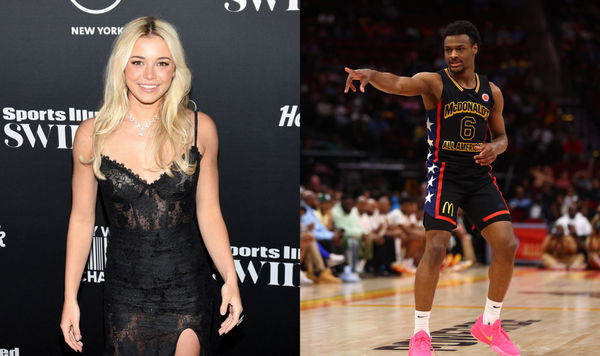
via Imago
Image credits : Imago

via Imago
Image credits : Imago
Since the NCAA’s groundbreaking decision to approve Name, Image, and Likeness (NIL) deals on July 1, 2021, collegiate athletics has witnessed a paradigm shift. This pivotal moment marked the dawn of a new era, empowering student-athletes to leverage their talents beyond sports and shattering the constraints imposed by previous NCAA regulations. Initially celebrated for their fairness and equity in collegiate sports, NIL rights promised to redefine the landscape of athletic compensation.
However, as this era unfolded, it brought with it complex opportunities and challenges. While athletes like Bronny James and Olivia Dunne command multimillion-dollar valuations for their NIL, the criticism they received highlights both the promise and the pitfalls. As we delve into these athletes’ stories and uncover the multifaceted impact of the NIL on sports culture, we will explore its implications for fairness, ethics, and the very essence of collegiate athletics.
ADVERTISEMENT
Article continues below this ad
How Bronny James has conquered the NIL scene
Bronny James, son of NBA icon LeBron James, has swiftly made his presence felt in the collegiate sports arena, emerging as the highest-paid male athlete in the NCAA and NIL era. Despite suffering a cardiac arrest earlier in 2023, Bronny’s resilience and talent have garnered significant attention and admiration. Bronny’s journey in the NIL landscape has been nothing short of remarkable. With his captivating persona and impressive athletic skills, he quickly ascended to the top echelons of collegiate sports earners, securing lucrative deals with renowned brands like Nike, Beats by Dre, and Google.

According to On3, Bronny’s NIL value stands just under $5 million, setting a new standard in men’s college basketball. However, alongside his meteoric rise, Bronny has faced criticism for the staggering wealth generated through NIL deals. Some have questioned the fairness and equity of the system, highlighting the disparity between top-tier athletes like Bronny and their counterparts. Comments such as “Bronny is very undeserving” and “So Bronny makes more than Shadeur…thought it’s the other way round,” reflect the sentiment that his earnings may not be commensurate with his performance or contributions to the sport.
Despite these criticisms, Bronny has remained steadfast in his pursuit of excellence on and off the court, maintaining a strong commitment to his teammates and the game. In the latest update, Bronny James has declared his intention to enter the 2024 NBA Draft while simultaneously entering the transfer portal to explore new collegiate opportunities. Despite his decision to pursue professional basketball, Bronny’s impact on collegiate sports and the NIL landscape is undeniable. Now, let’s shift our attention to the highest-paid female athlete.
How Olivia Dunne, the TikTok royalty, owns her demographic
Olivia Dunne’s journey to becoming the highest-paid female college athlete and influencer began with her innovative social media strategy, particularly her viral “beach-nastics” videos on TikTok, which gained traction during the pandemic. Despite her initial success online, when she entered college, she found herself restricted by NCAA rules that prevented her from leveraging her name, image, and likeness, a situation her mother Kat described as “unfair” due to the NCAA essentially owning her.

Upon the introduction of NIL deals in 2021, Olivia seized the opportunity to monetize her platform, quickly becoming the highest-paid female athlete and earning six-figure checks. She acknowledged the challenges she faced, stating during a Sports Illustrated interview, “People definitely discredit what I do,” while emphasizing the years of hard work and audience building that led to her success. Frustrated by the disparities in NIL opportunities, Olivia took action by launching the Livvy Fund to empower other women athletes at LSU and dismantle gender biases prevalent in collegiate athletics.
Teaming up with Accelerator Active Energy, she expanded the fund’s impact, providing endorsement opportunities to fellow athletes like Kiya Johnson and Chase Brock. Despite facing obstacles, Livvy defied skeptics, showcasing her commitment to empowering women in sports. As she continues to excel in the 2024 gymnastics season with LSU, Olivia Dunne remains a trailblazer, challenging norms and paving the way for a more equitable future. Like Olivia Dunne and Bronny James, countless other athletes are making waves in the NIL scene.
NIL Top earners divulged
Among the top earners, besides Bronny James and Olivia Dunne, are Caitlin Clark, Angel Reese, Quinn Ewers, Travis Hunter, Arch Manning, and Shedeur Sanders. Caitlin Clark, the all-time leading scorer in NCAA women’s basketball, has capitalized on her on-court success with deals from major brands like Gatorade, State Farm, and Nike, solidifying her position as one of the most dominant players in the game. Angel Reese, the LSU basketball standout, has leveraged her social media presence and athletic achievements to secure partnerships with Coach, McDonald’s, and other top brands, all while advocating for important social causes.
ADVERTISEMENT
Article continues below this ad

Shedeur Sanders, following in his father’s footsteps at the University of Colorado, has made waves with his performance on the field and lucrative deals with companies like Urban Outfitters, Oikos, and Mercedes-Benz, demonstrating the impact of family legacy and athletic talent on NIL opportunities. The implementation of NIL deals has indeed opened doors for athletes, but it has also sparked complex ethical and practical debates about the changing nature of college athletics.
ADVERTISEMENT
Article continues below this ad
Critics worry that the emphasis on personal branding may eclipse the core values of sportsmanship, fair competition, and academic pursuit. However, athletes like those mentioned here demonstrate that their hard work and marketability have rightfully earned them NIL deals. So, what’s your take on NIL deals? Are they a blessing or a curse? Share your thoughts below!
Read more: 16-Year-Old Quincy Wilson Has Been Breaking Records Not Only on the Track but Also Beyond It
ADVERTISEMENT
ADVERTISEMENT
ADVERTISEMENT
ADVERTISEMENT

